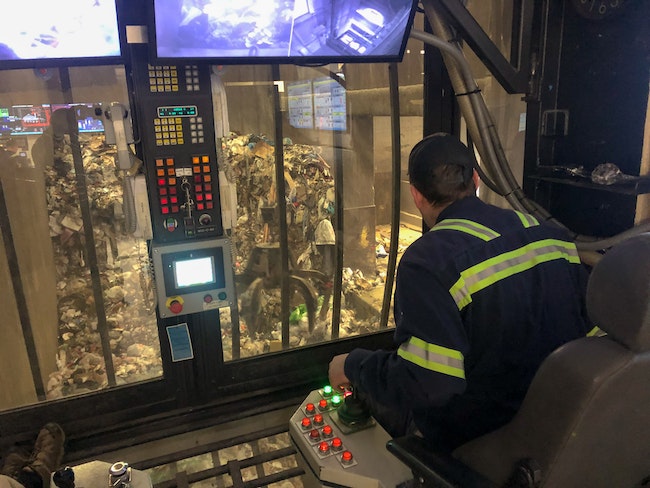 A Covanta Marion worker operates the claw that hoists trash into the incinerator. (Troy Brynelson/Salem Reporter)
A Covanta Marion worker operates the claw that hoists trash into the incinerator. (Troy Brynelson/Salem Reporter)
Garbage truck after garbage truck wheels into a nondescript industrial area in Brooks every day, bringing heaps of trash to the Covanta Marion waste incinerator.
Last year, trucks hauled in 168,343 tons of garbage to the plant. Much of the garbage is burned to generate electricity.
That waste-to-energy process may come to a halt soon, and impact the garbage bills paid by tens of thousands of Marion County residents.
Facing rising maintenance costs at the plant, New Jersey owner Covanta has signaled the plant may not make any more financial sense if state lawmakers next month don’t make it legal for the plant to sell some of its electricity as “renewable” – at a higher price.
What would Marion County do if Covanta walks? Some possibilities may come into focus later this month when county leaders discuss a recently commissioned report. Salem Reporter obtained the report via public records.
The 77-page report, from Virginia-based consultant Gershman, Brickner & Bratton, examines the county’s system for managing waste, but it also suggests back-up plans if Covanta Marion appears to be closing.
The report recommends Marion County should work out a short-term agreement that would keep the plant running for at least three years, providing time to find a way to replace it.
If that doesn’t work, the report said Marion County could turn the facility into a transfer station, where trucks would deposit trash before other trucks hauled the trash to a landfill out of the area, the report said.
County officials tell Salem Reporter that no decision has been made about which landfill that would be.
“We would go through a formal request for proposal process to determine which disposal facility” would be used, said Brian May, who manages the county’s environmental services division.
Marion County could also buy the plant from Covanta and operate it directly, the report suggested. But county officials say that is far less likely to happen.
“We don’t have the expertise or knowledge in that system,” May said. “I don’t see how we’d look at this and say we’d be more efficient at operating this facility (than Covanta).”
The report is currently a draft, noted Marion County spokeswoman Jolene Kelley. It’s possible at meetings in late January that the idea to buy the facility is nixed from the report.
“That’s the first formal look by the board,” Kelley said.
In the past, county officials have said that if the Brooks plant closed, garbage would be hauled to a landfill in the eastern Oregon at Arlington.
There is a possibility this question won’t need to be answered. The House Committee on Agriculture and Land Use intends to introduce legislation on behalf of Marion County that asks lawmakers to deem the plant “renewable” and sell some of its power at a premium.
A similar proposal failed to pass the Legislature last year.
Have a tip? Contact reporter Troy Brynelson at 503-575-9930, [email protected] or @TroyWB.









